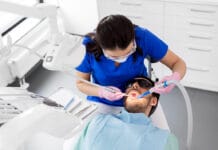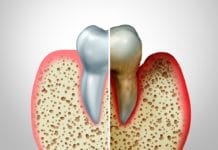I believe every school-aged child should have access to necessary hygiene items, for free. There is no reason for children to go without the basics needed to succeed. I have experienced numerous times while performing hygiene treatment in schools, as I’m explaining why they need to brush better, children telling me they don’t have a toothbrush. Then seeing their excitement when I give them one.
As wonderful as their excitement at the time is for receiving their very own toothbrush, I often feel saddened and want to do more. What if these children don’t have toothpaste to put on their shiny, new brush? When I worked in private practice, we would send the children home with a brush, floss, travel paste, a bag to carry it all home in, and they even got to pick out a toy. On the other hand, the school program is government-funded, underfunded at that, and the family has to qualify under the All Kids Program.
You can’t wash your hair without shampoo or apply deodorant if you don’t have any. You certainly can’t brush your teeth without a toothbrush, or floss without any floss, unless your crazy and use fishing line or something. I believe these items should be free to children who need them. It’s not their fault their parents cannot adequately provide for them even though these items are not overly expensive. Think about it next time your shopping; if you had to pick up a toothbrush, toothpaste, floss, shampoo (can be used for the body too), and deodorant; would you be able to get all of it for under five bucks? Yes, you can. It may not be the shampoo your hair would like, but yes, it’s possible on a budget. The cost of these hygiene items isn’t always the problem; it is the knowledge of the importance of oral health that is lacking. The importance is missing. If someone doesn’t understand the importance, then it will never be a priority.
If a child has pain from a toothache, you better believe that is consuming them all day long, especially at school. If your new to the hygiene field, forgot, or never knew, tooth decay is the world’s oldest and most widespread disease. It is also the #1 chronic childhood disease. Why in the world has this not changed!? Especially with all the knowledge and advancements we have made over the years in dentistry!
Here’s the problem. You can’t expect a child to take care of their teeth if the parents or guardians don’t. The old saying, “The apple doesn’t fall far from the tree,” holds true a lot of the time. Say showering, for instance, if it’s not a regular routine for the parents, there is a pretty good chance their child won’t shower regularly and will have an odor. If the importance to take care of someone’s oral health is not instilled at a young age to prevent future problems, these children don’t know any different. If they don’t know any different, they don’t do any different, and there will never be a change.
It is my belief, to fix this ongoing problem and cycle, we need hygienists on staff full-time in schools. Hygiene as a whole needs to be taught at school. I can’t tell you how many times I’ve had a child in my chair, mouth wide open, looking like a baby bird, as I’m showing the parent visible decay, explaining the decay needs to be addressed soon. The parent stares back at me and says, “I didn’t know baby teeth can get cavities and cause pain, but why does it matter? They’re just baby teeth?” What in the world! Why do they think that?! Lack of knowledge. Education, education, education. Show and explain.
We, as hygienists, play a huge role in knowing a person’s overall health. A child’s mouth is a gateway to their little bodies, and we know there is an oral-systemic link. You know so much about a child after one visit in the chair; their brushing and flossing habits, you have a pretty good understanding of their nutritional habits by looking at the decay aspect, and also their behavior while in the chair. Studies show that lack of nutrition leads to lack of focus resulting in poor grades and sometimes behavior problems. Food is nourishment for development. If a child has a high decay rate, you would assume their diet may be sugar-filled and less than nutritional.
If you have a child with heavy, spontaneous bleeding for no reason, you could suspect early diabetes, or at a minimum, want to look into their health further. How many days has the child been sick from school? We should play the role of investigator. Along the same lines, most parents don’t know about the risk of dry mouth for kids using inhalers, and the increased risk of decay and possible gingival inflammation that can ensue. Educating yourself, so you can educate your patients, in understanding why kids are caries prone, to begin with, is so important. Dental decay is 100% preventable! We are not only cleaning teeth and educating on proper oral care but also proper nutrition and healthy lifestyle habits.
Far too many of the children I’ve seen are already missing permanent teeth due to extraction due to severe decay, and parents not being able to pay for a root canal and crown to save the tooth. It’s incredibly sad, to say the least. The first step in digestion is chewing; people need teeth to chew!
A healthy mouth is so important, and as hygienists, we know and believe this because we visibly see the disease on a regular basis. We see the decay or gingivitis that our patients may not. Just like not everyone knows when their hair needs a good scrubbing. You would think they could see and feel it if others are seeing it, but sometimes people don’t. Ask any hairdresser. Sometimes people don’t know keeping their body clean on a regular basis is normal. I’m sure you’ve passed someone a time or two at a store or had them in your chair. This too has to be taught or addressed at school to stop the cycle.
In my lifetime, my goal is to change our dental laws, restrictions, and policies. When it comes to the importance of oral care and overall health, there has to be a standard and a huge degree of importance on the education front. This standard should begin in kindergarten, at the very beginning of a child’s school career. I envision dental clinics in every school, with once or twice per school year appointments where every child has their teeth checked and cleaned by a hygienist. Hygienists will teach children at a young age to prevent future problems and put a stop to the #1 chronic childhood disease. By doing this, I believe there will be fewer children with dental phobias that were more than likely rubbed off from the parents. This is the standard I dream of.
I know it is a huge, unthinkable, implausible, expensive goal. Gosh, we can’t even legally tell someone they have a cavity, and some states don’t even allow local anesthesia to be administered by a dental hygienist. What you will never see, is hygienists sitting behind bars or at the very least who lost their license to practice, because they diagnosed a patient. I feel there is room for change in our profession.
We need to wake people up, make a difference, and help these kiddos. There is a huge need for dental hygienists, and we can make an enormous difference in a child’s life if hygienists were part of school systems. This is my belief. For now, we can at least get the kiddos the supplies they need to take care of their precious smiles. Don’t be afraid to donate items to your local school. You would be shocked to know how many kids need our help!
SEE ALSO: Tips I Wish I Knew in Dental Hygiene School
DON’T MISS: Ergonomics: If I’d Only Known












